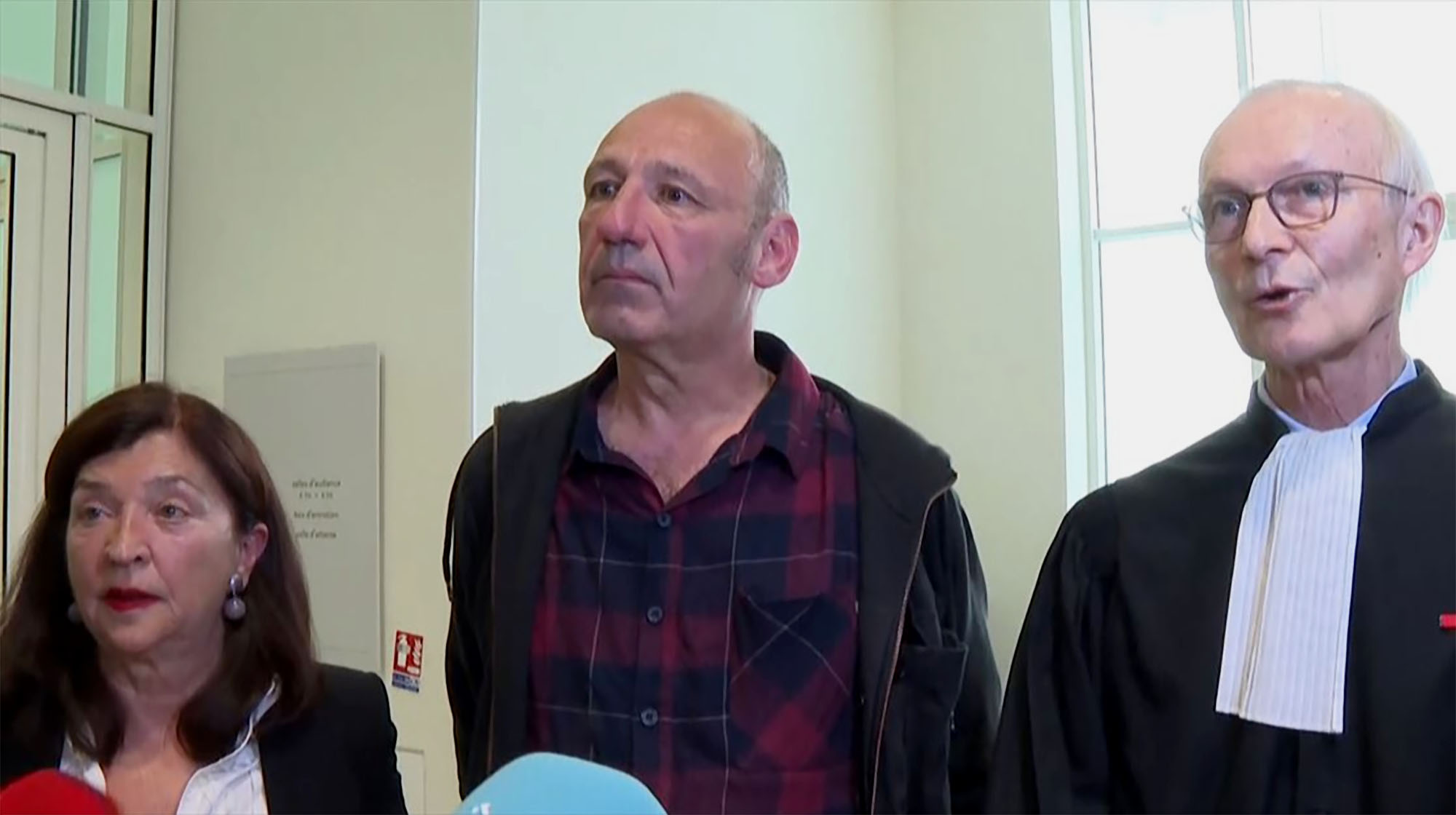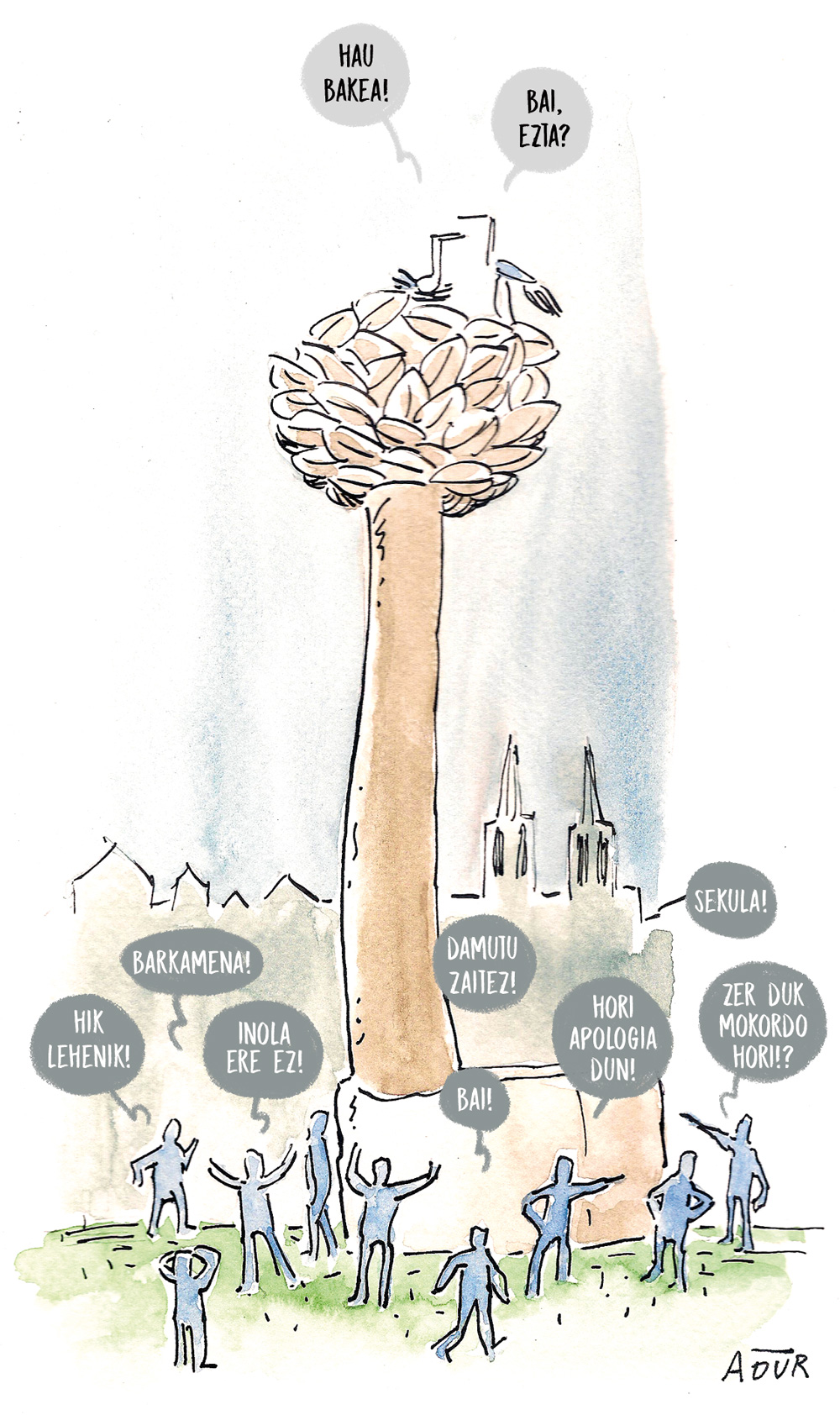The pacifists reject the version of the Basque Government showing the minutes of disarmament
At a hearing in Baiona, the pacifists have given their version of what happened in the disarmament of ETA between January and April 2017. The Txetx bakista Noel Etxeberri has assured that the report of the Basque Government’s disarmament was “false and interested” and regretted the account he has made so far. The Basque Government, for its part, has ensured that it has never had confidence in the pacifists. They have presented a very varied document on the process of disarming the eta that is taking place.

On the day of the eighth anniversary of the arrests in Luhuso, the pacifists have offered a press conference to offer their version of what happened, according to Berria. In 2019, the Basque Government published a report describing and evaluating what the Basque Government has done in the disarmament and dissolution of ETA. Subsequently, pacifists Mixel Berhokoirigoin and Noel Etxeberri issued a communiqué showing their disagreement with the version of the Basque Government. On that occasion they said that the meetings between the two parties would be made known when the time came. They have now taken that step and produced a report of 68 pages in which they refute, point by point, various assessments and observations of the Basque Government. The contents of the meetings are also included in the report: Explanation by the peacemakers of the actual facts of the last phase of ETA disarmament.
Lies and acknowledging “the role he did not have”
The pacifists say that the Basque Government "attributed itself to the role that the French Government had, in a somewhat pathetic way". As explained by the members of the band, the French Government decided to stop disarmament and communicated it to the Spanish Government.
They have censored the Basque Government's suggestion that they influenced the negotiations for the organisation on 8 April. The pacifists had a direct channel of communication with Paris.
The announcement of the disarmament of ETA in the newspaper Le Monde on 8 April was criticised by the pacifists, who have accused the Basque Government of trying to prevent it.
With regard to disarmament, the Basque Government pointed out that the pacifists’ intention was to “destroy and clean” the weapons, and that if they had done so “they could have charged them with serious crimes”. This version has been denied by the artisans of peace, who have explained that they only used material to "neutralize" weapons. According to the report of the Basque Government, the intention of ETA and the peacemakers was to repeat operations such as Luhuso. The pacifists have explained that they transferred to lehendakari, Iñigo Urkullu, their intention to do "something more massive and concentrated in time." On the other hand, the pacifists have regretted that the Basque Government has said that they originally wanted to organise a “party” for 8 April and that the Executive convinced them not to do so. The pacifists affirm that from the outset there was provision for a “dignified mobilization” that “would respect the victims and the sufferings of each party”.
The greatest discrepancy occurred at the location where the observers were present. According to the pacifists, the Basque Government did not want the citizens to be in the place where the arms were delivered, and this was stated in the report: "The French police approached the warehouses to take control of the remains. In these locations, small groups were found observing the operation at a certain distance and under police control. Fortunately, there were no altercations.” The news reports a video of the arrival of the French Police at one of the shelters, which shows a different version: the police chiefs greeted the observers and gave their hands to everyone.
The Manu Robles Arangiz Foundation summarised the document point by point:
- Interested rewriting of history: The pacifists say that the Basque Government’s report offers a partial and false version of the disarmament process, minimising Bakegile’s contribution and presenting it as a central actor that was not the Basque Government.
- Disagreement on the Luhuso Operation: While the Basque Government’s report points out that the Luhuso operation was a failure, the Bakegiletizers say it was essential to unblock disarmament and change the attitude of the French and Spanish governments.
- The role of the Basque Government in the negotiations: The Basque Government’s report is intended to play a role in the negotiations with France, but the Pacifists have made it clear that the discussions with Paris were conducted directly with the prefects and with the French representatives, not with the Basque mediators.
- False accusations about the intentions of pacifists: The report falsely accuses the pacifists of wanting to organise a demonstration party on 8 April 2017 and of wanting to destroy the weapons, but in reality they always promoted a dignified and respectful mobilisation of the victims, as well as a controlled and verifiable delivery of weapons.
- Rejection of the peacemakers plan: Although the Basque Government initially described the peacemakers' plan as "unrealistic" and "irresponsible", the facts show that the only viable way to achieve total disarmament without incidents and without arrests was.
- Relationship with the French Government: The pacifists say they maintained a more fluid and constructive relationship with the French Government than with the Basque Government. In fact, the Basque Government was suspicious and wary of recognising the ability of the Bakegileys to engage in dialogue with the French authorities.
- Discrepancies on the day of 8 April 2017: The pacifists accuse the Basque Government of trying to implement changes to the plan by 8 April.
- False assertions about the legality of the proceedings: The Urkullu report suggests that the Pacifists did not respect the legality of disarmament, while the Pacifists assert that the guidelines of the French Government were followed and that, although some actions were within the limits of legality, these actions were justified in order to avoid violence and achieve its objective.
- Lack of recognition and protection: The pacifists have stated that the Basque Government does not recognize and support its work, although the representatives of the French Government and other institutions recognized the importance of the Pacifists in achieving total, verified and non-violent disarmament.
- Lack of loyalty: The Basque Government filtered the operational format to the media on 8 April 2017. This leak caused the pacifists to lose confidence in the Basque Government and, from that point on, they were unable to share any decisive information.
- Growing conditions: When pacifists met all the requirements set by the Basque Government, the government added new requirements, always calling for further steps. This became the main obstacle for the Peacemakers, which made the working relationship with the Basque Government virtually impossible. The French Government did not act in this way and held confidence-based talks.
- Great dependence of PP: The pacifists say that the Basque Government believed the pp government and Mariano Rajoy, although it was known that the Spanish Government was liking and intended to obstruct the process with the arrests. Following the talks held by Rajoy and Urkullu, the Basque Government seems to have been in a state of nervousness. Rajoy's words on the French Government did not correspond to those heard by the pacifists in the live talks in France. This weakens the position of the Basque Government and leads to a loss of control of the process.
- Lack of vision and clear direction: in recent days of disarmament, in Arkaute, the Basque Government focused on a sterile organization of the week, while the French Government and the Pacifists shared the details of the process. The main political and trade union players, who supported disarmament, also gave their approval to the parliaments of Navarre and the CAV. The Basque Government, on the other hand, was left out of this trend and lost the possibility of capitalizing on its positive intervention in the process.
- Contempt for the North and the Peacemakers: The Basque Government did not believe that the Pacifists could have a direct relationship and direct access to the senior officials of the French Government. It is well known that the management model of the Government of Vitoria-Gasteiz is particularly far from the natural participation of civil society, which caused a lack of understanding throughout the process, by conditioning the entire strategy of the Government, unable to understand and assimilate reality.
Josu Urrutikoetxearen aurka bi auzi iragan behar dira aste huntan Pariseko auzitegi korrekzionalean. Biak ere ETA talde armatuko kide izateagatik dira, baina mementu desberdinetan.
Astelehen eta astearte honetan Parisen epaitzen ari dira David Pla eta Iratxe Sorzabal. ETAko kide eta ordezkari izatea, armak eta dokumentu faltsuak eta propaganda materiala izatea leporatzen diete.
Estatu-arrazoia bezain iluna da Rubalcaba, estoldetako politikari bat, institutuko irakasle baten itxura kaltegabe hori eduki arren. Itzalpean mugitu zalea, botere faktikoekin aireztatu gabeko sotoetan edukitzen diren elkarrizketetan; zeren hortik at, animalia izu eta itsusia... [+]






















